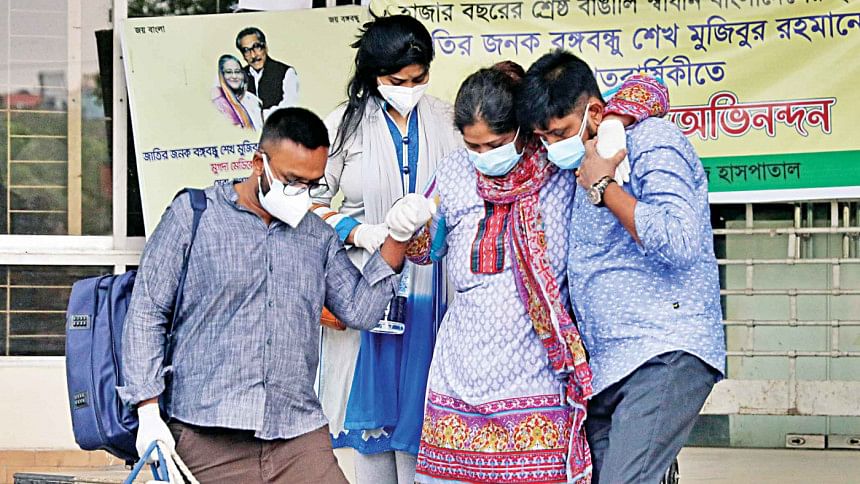News Analysis: Are we doing our part?

The record of daily cases of Covid-19 got shattered yesterday and deaths from the deadly virus have been climbing every day. Hospitalisation is soaring as well. But the situation on the streets hardly gives any indication of how dangerous things have become.
Most people seem to have a false sense of security as they reject personal responsibilities and leave home without a mask, which is essential to stop the spread of the virus.
Go to any public place or a kitchen market, and you will encounter an intense apathy towards safety measures. People seem to care little about the danger that they are putting themselves and others into.
After killing a few thousands of people and wreaking havoc on the economy, Covid-19 seemed to be loosening its grip on the country. The curve of cases, hospitalisations and deaths steadily decreased for two consecutive months this year.
But since the second week of March, coronavirus reemerged with mutant strains, threatening lives, livelihoods, and our vulnerable public health system again.
Yesterday, the health directorate reported the highest number of infections recorded in a single day, 5,358, with a positivity rate of 19.90 percent. The number of deaths rose too. Yesterday, 52 deaths from Covid-19 were reported, the highest in seven months. The death toll is now 9,046.
The government and health experts alike have been sounding alarm for quite a while. They have been urging people to maintain health safety guidelines, wear masks and maintain social distancing and hygiene.
To curb the spread, the government, albeit late, has come up with 18 instructions on people's movement that will remain in force for at least for two weeks.
This begs the question: Have the authorities created enough public awareness about the virus and its impact on people's lives and livelihood?
The answer is no.
For example, the UK variant was detected in January and disclosed by the media in March.
The mandatory quarantine for returnees, contact tracing, rigorous testing were never in place to contain the new threat.
The government seemed to have had its priorities mixed-up.
It needed to build its capacity – more ICUs, oxygen supply -- and re-energise its frontlines ahead of a fresh battle.
But that was not done.
The people will hold the government responsible if it fails to ensure the measures, be it healthcare services or financial assistance, required to tackle the situation.
But as citizens, we have our part to play to suppress this pandemic too. Are we doing those? Are we, the people, heeding to the advice seriously?
A few people are following the guidelines religiously, but the majority don't even think twice before flouting them. It is as if the fear has gone and everything is back to the pre-pandemic time.
Events like mass congregations, parties or social get-togethers are being held like they used to before the pandemic. Or in other words, we have become too careless to take the matter seriously.
Even at this crucial juncture, we are unfortunately seeing a lack of social responsibility among all sections of our society, illiterate, semi-literate, educated and highly skilled professionals. Ask anyone about the refusal to follow health guidelines and you will hear: "I don't need a mask as I've already had Covid" or "It's not going to make much of a difference" or "Covid only infects rich people".
The most worrying of the excuses is: "I already got the vaccine, so I don't need a mask".
There have been other disturbing reports like people escaping from quarantine in hospitals.
Even when things are normal, we tend to flout laws and social norms, be it traffic or others, without thinking about the consequences or inconvenience caused to others.
In this crucial time, we need to understand the consequences of our actions. It is not only for us, but for others as well. We have a huge number of senior citizens and middle-aged people vulnerable to Covid-19 as they have comorbidities like cardiac conditions, diabetes, and asthma.
And a single instance of irresponsible behaviour could not only cost us our loved ones, but also take a heavy toll on our fellow citizens, our neighbours, and our country.
With the government immunisation programme going slow, we must understand that it will take many months to inoculate everyone eligible for the shots.
This new crisis requires us to reset our expectations and make behavioural changes. The government is doing what it can, but in the given situation we, the citizenry, should also understand our roles and responsibilities to stop the transmission.

 For all latest news, follow The Daily Star's Google News channel.
For all latest news, follow The Daily Star's Google News channel. 



Comments